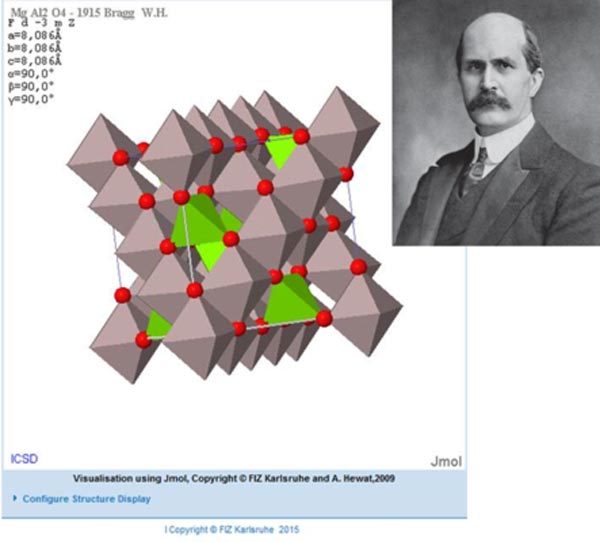New value added to the ICSD (Inorganic Crystal Structure Database)

William Henry Bragg with one of the crystal structures he identified Quelle: ICSD - FIZ Karlsruhe
ICSD, the world’s largest database for completely identified inorganic crystal structures, has been complemented with two important content features. Firstly, many author abstracts were added to the documents. These texts offer more than just mere information on structures and provide a global overview of the related scientific articles.
The documents were also assigned a DOI (Digital Object Identifier) so that the full-text document can be accessed online by simple mouse click. Secondly, FIZ Karlsruhe has established its own base of scientific keywords to index the documents.
The link-up with these keywords that are selected from a defined thesaurus enables a deeper content indexing. Thus it is possible, for example, to precisely search for physical characteristics of the crystal structures or for information on their spectroscopic analysis.
Since 2017, ICSD also contains systematically collected theoretical structures. For this purpose, the related scientific literature is regularly examined and the theoretical structures are extracted and included into the ICSD. This makes the database a platform where theoretical scientists can retrieve deposited standardized data.
Although many of these calculated structures have not been experimentally confirmed yet, the information can give important hints on potential polymorphs or serve as a starting point for a refined crystal structure analysis according to the Rietveld method.
“ICSD offers the scientific community an indispensable basis for their crystallographic research. Its new content makes this valuable database increasingly useful for materials scientists,” explains Sabine Brünger-Weilandt, President and CEO of FIZ Karlsruhe – Leibniz Institute for Information Infrastructure.
More information on ICSD and its new, user-friendly features can be found at https://www.fiz-karlsruhe.de/leistungen/kristallographie/icsd.html. Today starts the annual meeting of the German Crystallographic Society (DKG) in Karlsruhe/Germany, see http://www.dgk-conference.de/. The new ICSD content will be introduced at FIZ Karlsruhe’s ICSD Lunchtime Symposium held within the scope of this meeting on March 30, 2017, from 12:00 to 13:30.
The Inorganic Crystal Structure Database (ICSD) is the world’s largest database for fully identified inorganic crystal structures. It contains the crystallographic data of published crystalline, inorganic compounds, including their atomic coordinates, dating back to 1913. It is produced by FIZ Karlsruhe and currently contains about 185,000 crystal structures. Updates are made twice a year (in spring and in fall) with data taken from scientific journals and other sources.
FIZ Karlsruhe – Leibniz Institute for Information Infrastructure is a not-for-profit limited liability company. As one of the largest non-academic information infrastructure institutions in Germany, we have the public mission to provide researchers and scientists with scientific information and to develop the appropriate products and services. To this end, we edit and index large data volumes from manifold sources, develop and operate innovative information services and e-research solutions, and carry out research projects of our own. FIZ Karlsruhe is a member of the Leibniz Association which comprises 91 institutions involved in research activities and/or the development of scientific infrastructure.
Press contact:
Marketing Communications
Rüdiger Mack
Phone: +49 7247 808 513
Ruediger.Mack(at)fiz-karlsruhe(dot)de
Science Communications
Dr. Anja Rasche
Phone: +49 7247 808 109
Anja.Rasche(at)fiz-karlsruhe(dot)de
More information:
FIZ Karlsruhe
Hermann-von-Helmholtz-Platz 1
76344 Eggenstein-Leopoldshafen
Phone: +49 7247 808 555
Fax: +49 7247 808 259
helpdesk(at)fiz-karlsruhe(dot)de
Media Contact
More Information:
http://www.fiz-karlsruhe.deAll latest news from the category: Materials Sciences
Materials management deals with the research, development, manufacturing and processing of raw and industrial materials. Key aspects here are biological and medical issues, which play an increasingly important role in this field.
innovations-report offers in-depth articles related to the development and application of materials and the structure and properties of new materials.
Newest articles

NASA: Mystery of life’s handedness deepens
The mystery of why life uses molecules with specific orientations has deepened with a NASA-funded discovery that RNA — a key molecule thought to have potentially held the instructions for…

What are the effects of historic lithium mining on water quality?
Study reveals low levels of common contaminants but high levels of other elements in waters associated with an abandoned lithium mine. Lithium ore and mining waste from a historic lithium…

Quantum-inspired design boosts efficiency of heat-to-electricity conversion
Rice engineers take unconventional route to improving thermophotovoltaic systems. Researchers at Rice University have found a new way to improve a key element of thermophotovoltaic (TPV) systems, which convert heat…



